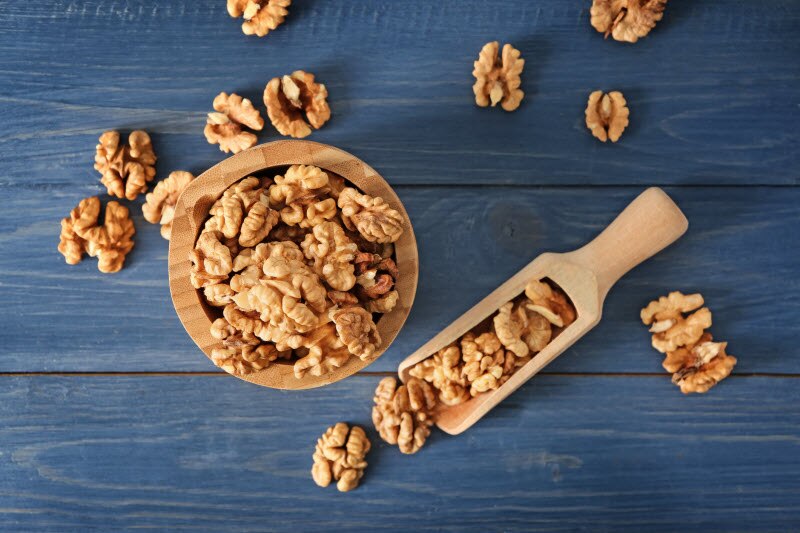Munching on walnuts every day might improve your health. A new Penn State University study found that daily walnut consumption fosters healthy bacteria in the gut – which in turn can protect the heart.
A healthy diet that emphasizes polyunsaturated fatty acids — from liquid vegetable oils and walnuts — promotes the bacteria Roseburia, which has been shown to protect the lining of the gut, the researchers concluded.
Penny Kris-Etherton, distinguished professor of nutrition at Penn State, says the university’s findings are just the latest in a long line of research linking consumption of nuts to improved health.
“Walnuts — and essentially all nuts — are considered to be healthy,” she says.
The health benefits of walnuts
Other studies have shown that walnut consumption can:
- Improve bone health
- Reduce the risk of gallbladder disease
- Possibly protect brain health as we age
Walnuts are rich in polyunsaturated fatty acids, which are better for you than saturated fats.
They also have alpha-linolenic and linoleic acids. Research has linked these acids to anti-inflammatory properties that promote the health of blood vessels.
In addition to promoting Roseburia, eating walnuts also enriches other types of healthy gut bacteria, including Eubacteria eligens and Lachnospiraceae.
Both of these bacteria improve blood pressure readings, and Lachnospiraceae is also linked to better cholesterol readings.
How many walnuts should you eat?
Penn State experts say eating 2 to 3 ounces of walnuts daily might reduce your risk of heart disease.
“Because of multiple health benefits of nuts, I recommend that individuals consume nuts — all types of nuts – regularly,” Kris-Etherton says.
Nuts are also a cornerstone of the Mediterranean diet, which many experts recommend to people as a way to improve long-term heart health.
The U.S. Department of Agriculture notes that walnuts have a “crisp light texture” and blend well with other flavors. As a result, they can be added to baked goods, salads and pasta dishes.
Or, you can eat walnuts whole and on their own. Penn State experts suggest eating whole walnuts in place of less healthful snacks during the course of a day.
Eating walnuts the right way
While eating walnuts can benefit gut and heart health, it’s important to incorporate them into your diet the right way.
Walnuts – and nuts in general – are rich in fat and high in calories. As a result, Kris-Etherton stresses the need to avoid overeating walnuts.
“Nuts must be incorporated in a healthy diet that does not exceed energy needs, so that weight gain does not occur,” she says.
In addition, walnuts and other nuts always should be consumed on their own, or as part of healthful dishes – not in candy bars.
“Eating nuts in foods that are high in added sugars, sodium and refined grains — with little nutritional value — is not a healthy way to incorporate nuts in the diet,” Kris-Etherton says.
Kris-Etherton also notes that some nuts – such as walnuts — may be better for you than other types of nuts. For example, Brazil nuts and cashews are relatively high in unhealthy saturated fat.
Because of their high caloric content, it also is better to eat nuts instead of unhealthful snacks, rather than eating nuts in addition to such foods.
Finally, eating walnuts does not make sense for people who are allergic to nuts, Kris-Etherton says.


